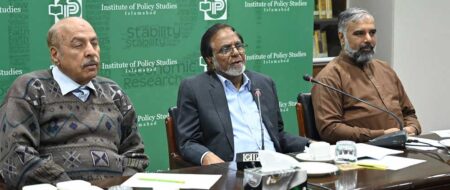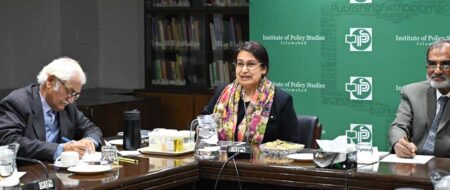‘Basic Exchange Cooperation Agreement: Implications for South Asia, Indo-Pacific, China and Pakistan’
Pakistan needs to be watchful of the growing partnership between India and the US, especially w.r.t BECA (Basic Exchange Cooperation Agreement) which aims to embolden the former to keep a check on the region. The development, which is all set to have far-reaching regional implications, demands Pakistan and China to fortify their relations further by exploring more avenues of mutual cooperation – not least in the defence and strategic domains, while elevating their bilateral ties from transactional to operational ones.
The views were expressed in a session titled ‘Basic Exchange Cooperation Agreements: Implications for South Asia, Indo-Pacific, China and Pakistan’ which was held at IPS on November 24, 2020. The session was chaired by EP-IPS Khalid Rahman, whereas the speaker’s panel included IPS Research Fellows Amb (r) Tajammul Altaf and Dr Tughral Yamin, and Sr IPS Associates Brig (r) Said Nazir and Air Cdr (r) Khalid Iqbal.
Altaf, while giving a holistic view of BECA and its implications for the region, said that the agreement signed in the 2+2 Ministerial bilateral dialogue between India and the USA was for geospatial intelligence and epitomized the Indo-US strategic partnership that began in 2005. Moreover, risks posed by the strategic embrace of India and the USA are high and too profound as BECA has opened doors for yet another era of arms race, strategic and security destabilization in South Asia, and power imbalance in the region. BECA will provide India with a facility to keep a close watch in the Indian Ocean and the Asia Pacific region.
Dr Tughral Yamin was of the view that India and the USA have had long term joint ambitions. This, according to him, was evident from the fact that the USA gave a special waiver to India when the latter conducted nuclear commerce without being signatory to the Non Proliferation Treaty. Despite acknowledging the fact that BECA will allow India and the USA to exchange geospatial intelligence, he believed the agreement will not tilt the regional balance of power in India’s favour. However, Pakistan should focus more on acquiring better drones as these surveillance satellites can give Pakistan fairly accurate information about static and mobile targets. He also warned India of its growing dependence on the USA which is notorious for leaving its allies in the lurch.
Brigadier (r) Said Nazir accentuated the need for having reliable information about an enemy which is a basic principle in any warfare. He said the intelligence-sharing pact is of strategic importance and is primarily against China as far as the USA is concerned. However, India will use this mechanism against Pakistan as well whenever needed. He feared the pact will disturb the regional balance vis-a-vis military capabilities, and will give a boost to the ongoing Cold War between China and the USA. The pact may create a war-like situation in the region and will erode the chances of strategic surprises and deceptions. This system will provide India the unity of command among its three forces and, hence, will have implications for China, Pakistan and the region. Commenting on the prevalent situation in Indian Occupied Kashmir, Nazir said it is high time for Pakistan to show India what will be repercussions of the forward policy that India is pursuing right now.
Air Cdre (r) Khalid Iqbal highlighted the importance of the intelligence-sharing pact that will enable both partners to share high-end military technologies. He said over the past two or three decades, warfare has transformed its composition in the wake of changing dynamics triggered by new technologies. The agreement is another proof of India joining hands with the USA and has agreed to become a pawn in the latter’s strategy of containing China. Nonetheless, the pact will allow India to gain real time American geospatial intelligence that can be used against Pakistan as well.
Rahman said BECA should not surprise policy circles in Pakistan because the agreement is a continuation of the growing US-India strategic partnership, which will continue to thrive in the future as well. Despite US intentions of emboldening India against China, India is not much interested in conflicting with China under US duress. Rather, India will use this opportunity to gain more military strengths and capabilities to outmatch Pakistan. He termed Pak-US relations as transactional and lamented that Sino-Pak relations have practically also not gone beyond the transactional level. Thus, he stressed, Pakistan needs to develop a comprehensive strategy with regards to China that touches upon every significant dimension of bilateral relations including economy and military hardware. Growing threats in the region deserve attention, he stressed, and all stakeholders need to be on the same page over the threat perception and from where it is emanating.












